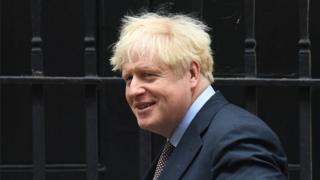 Image copyright
EPA
Image copyright
EPA
Boris Johnson has urged Conservative MPs to back his plan to override part of the Brexit withdrawal agreement.
In a Zoom call with around 250 of them, he said the party must not return to "miserable squabbling" over Europe.
The EU has warned the UK it could face legal action if it does not ditch controversial elements of the Internal Market Bill by the end of the month.
And a Tory MP has proposed an amendment to the bill, which would affect trade between Britain and Northern Ireland.
Meanwhile, the European Parliament has threatened to scupper any UK-EU trade deal if the bill becomes UK law.
The two sides have only a few weeks to agree a deal before Mr Johnson's 15 October deadline - after which he says he is prepared to "walk away".
Informal talks are due to resume on Monday amid "significant" differences.
The next official round of talks - the ninth since March - start in Brussels on 28 September.
Time and trust are running out
When it comes to Brexit, all negotiations are inter-linked: EU-UK trade talks, the process to implement their divorce deal, negotiations on fishing rights and Brussels' deliberation on UK financial service.
What happens in one area very much affects progress in the others. You cannot separate them entirely.
Which is why this week, as the war of words and wills between Brussels and Downing Street raged over the government's threat to throw a grenade at key parts of the divorce deal, everyone's thoughts turned immediately to the trade talks between the two sides.
Could they survive? In fact, they limp on.
Despite bitter arguments over legislation and a huge list of outstanding issues still to be ironed out in bilateral trade talks; despite time and trust running out on both sides; neither the EU nor the UK seem to want to be the first ones to walk out the door.
The Internal Market Bill, which will be formally debated in the House of Commons for the first time on Monday, addresses the Northern Ireland Protocol - the part of the Brexit withdrawal agreement designed to prevent a hard border returning to the island of Ireland.
If it became law it would give UK ministers powers to modify or "disapply" rules relating to the movement of goods between Britain and Northern Ireland that will come into force from 1 January, if the UK and EU are unable to strike a trade deal.
The EU says the planned changes must be scrapped or they will risk jeopardising the UK-EU trade talks.
But the government has rejected this demand, arguing the measures in the bill are needed to protect the integrity of the UK and the peace process in Northern Ireland.
Northern Ireland Secretary Brandon Lewis has admitted the change, which would go against a treaty signed by the UK and EU, would "break international law in a very specific and limited way".
Conservative backbencher Sir Bob Neill, who chairs the Commons Justice Committee, is tabling an amendment to the bill to try to force a separate parliamentary vote on contentious clauses that have angered the EU.
In his Zoom call with MPs on Friday, the prime minister did not take questions and a poor signal meant the video and audio connections were lost for several minutes.
At around the same time, the European Parliament announced it would "under no circumstances ratify" any trade deal reached between the UK and EU if the "UK authorities breach or threaten to breach" the withdrawal agreement.
Business Minister Nadhim Zahawi defended the bill as necessary, in case existing "ambiguities" in the withdrawal agreement are not settled through the formal dispute resolution process.
But there is unease within the Conservative Party, with former leaders Theresa May, Lord Howard and Sir John Major urging him to think again.
Gordon Brown has become the latest former prime minister to warn of the damage the move could do to the UK's international reputation, telling BBC Radio 4's Today programme it was a "huge act of self-harm".

 5 years ago
597
5 years ago
597 

